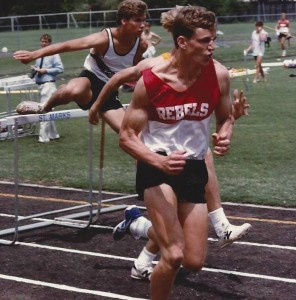Outrunning Cancer
 A high school friend died of cancer last night. A total stud. He was captain of both the football and track teams, and we were the Rebels. He embodied every bit of it: fierce, determined, strong, passionate. But more importantly, he was kind and funny with everyone.
A high school friend died of cancer last night. A total stud. He was captain of both the football and track teams, and we were the Rebels. He embodied every bit of it: fierce, determined, strong, passionate. But more importantly, he was kind and funny with everyone.
He leaves behind a family, wife, daughter, mother, sister…
Today in the United States, 1 in 2 men are expected to get cancer. It’s stealing husbands, dads, friends, brothers, uncles. It is robbing us of people that we love, taking lives too soon, too early.
In this work, I hear from cancer moms and dads all of the time. Too much. More children and young adults under the age of 40 die of brain cancers than almost any other cancers. Children who have never held a cell phone, adults who have. Cancer is now the leading cause of death by disease in American children under the age of 15.
Cancer doesn’t care.
In the wake of losing this friend, I haven’t been able to do much more than think about stopping the runaway rates of this disease.
I’ve seen friends lose their moms, moms lose their sons, and wives lose their husbands. It has to stop. We can no longer support the cancer economy, it is taking too great of a toll on our country.
According to the National Institute of Health, “the economic burden of cancer in the US is substantial and expected to increase significantly.”
The costs of cancer care in the US in 2010 were estimated to be $157 billion dollars. There are expected to be 18.1 million cancer survivors in 2020, 30% more than 2010. We are saving lives, but what are we doing to stop cancer diagnoses in the first place?
The total cost of cancer care in 2020 is projected to be $174 billion, according to the National Cancer Institute.
Imagine if instead of building the cancer economy, we built the prevention economy. What would the economic impact of that be on our communities, our schools, our military 20 years from now?
How will we be able to defend our country if we are too sick to fight for it?
“The average gross household income in the U.S. is about $52,000 per year. For an insured patient with cancer who needs a drug that costs $120,000 per year, the out-of-pocket expenses could be as much as $25,000 to $30,000 — more than half their average household income” reported 118 oncologists, urging that we address the issue of the skyrocketing costs of cancer treatments.
Out of the nearly $374 billion Americans spent on prescriptions in 2014, $32.6 billion – about 9 percent – was spent on oncology drugs, according to the annual report by IMS Health Informatics. Another $11.1 billion was spent on supportive care treatments, which help with the side effects of strong chemotherapy drugs.
In the annual report by IMS Health Informatics, cancer drugs were not the most widely prescribed by a long shot.
Prevention would be the smartest way to address it, especially given that a study published earlier this year in the Journal of Economic Perspectives found that cancer drug prices have increased an average of $8,500 a year over the past 15 years.
We have to #stopcancer. Too many lives have been lost. It doesn’t care what side of the aisle we are on, whether we live in Oregon or New York City. It is fearless fierce and becoming a tumor on our economy.
But love is fearless, too.
If the fact that 1 in 2 men and 1 in 3 women in this country are supposed to get cancer in their lifetimes isn’t some kind of call to action, I’m not sure what is…1 in 1 men?
Today, we lost an incredible man. We aren’t the only ones. This theft is becoming far too prevalent.
To learn what you can do to protect yourself and the people that you love, to protect our country, please visit http://anticancerlifestyle.org.
It’s time to stop not only the economic burden of this disease, but the heartache and emptiness it leaves in its wake.
This friend who died taught me, when we were teenagers, to dance the night before every birthday. He said, “You have to celebrate the year that you’ve just had.” It’s now a tradition, and something I’ve taught to my kids.
He’s dancing somewhere else now, but while we are still here, we need to change the tune.
#stopcancer
Written in memory of Stephen Kaestner.
